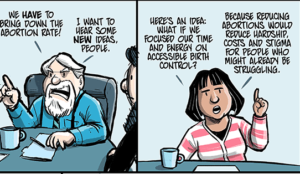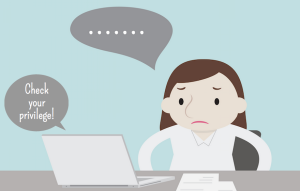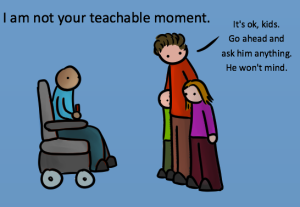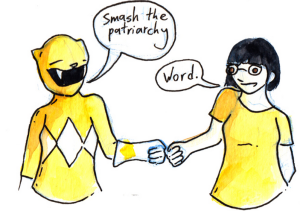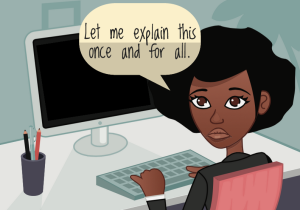
Person wearing black and white checkered shirt while sitting at office workstation and holding a pen in one hand.
Originally published on Medium and republished here with the author’s permission.
Last weekend, my husband, Mike, and I were walking down the street while discussing Anita Sarkeesian.
If you don’t know her, here’s my CliffNotes version of her biography: Anita founded Feminist Frequency, a YouTube series that critiques how women are portrayed in pop culture (specifically video games). She’s much more than that these days, as a voice and advocate for feminism in popular culture (among other things), but that’s where she started.
As Mike and I were waiting for the light to change so we could cross the street, we were debating some of the recent remarks Anita had made about a newly released video game.
We began debating not just what she had said, but how she (and others) critique, and the very polarizing and hostile climate online right now for women bringing up issues of sexism, misogyny, harassment, and ugly pop culture tropes.
Crossing the street, I looked askance at Mike and said, “You know, you’re going to hate when I say this, but you have privilege and are able to speak up more loudly and freely about these issues than me and criticize them more harshly because you are a dude.”
He stopped in the middle of the street for a beat and looked at me, with a horrified realization on his face, and exclaimed, “Goddamnit, that is the worst!”
A car honked at us, and we scurried to the sidewalk.
My statement about my husband’s privilege to be able to speak more freely about feminism, criticism, and the current debates around not just the issues, but those debating the issues is correct.
If he and I say the exact same thing about a topic or a person speaking on a topic, he will be scrutinized significantly less than I am for identical statements.
And while that is an instance of male privilege, that doesn’t make his statements less valid or him less of an ally. In fact, the realization, frustration, and anger I saw flash on his face when I pointed it out is one of the reasons he’s an excellent ally (and also why I love him).
No one is infallible. No one is immune to hypocrisy, whether it’s conscious or otherwise.
We improve by discussing things, warts and all, acknowledging weaknesses, and trying to modify. It sucks to be told your views are hurtful or harmful or privileged, but sometimes it’s a fact of life.
Being defensive doesn’t help – and usually, it sets us back several steps.
Recently, I read a brilliant (and hilarious) article by Cate Burlington called “Things My Male Tech Colleagues Have Actually Said to Me, Annotated.” As I read this article, I nodded my head, smiling and chuckling, while also feeling vaguely nauseous because this article needs sarcasm – otherwise it’s too fucking depressing.
What’s been nagging me about this article since I read it in April isn’t just the sexist things men say during work. It’s how folks react when I bring up these kind of remarks.
Tell someone an office mate once said to you “You and my wife could mud-wrestle naked,” and people will gasp, horrified, and talk about how inappropriate and awful that is.
They’ll also downplay the statement (tacitly or implicitly) because it’s an awful, rare, edge case that is extreme and doesn’t happen that often.
Worst case scenario, people say that you are using only the more egregious examples and playing them up – like sharing the most horrible shit men say to women while they’re trying to do their jobs is a way to gain attention, pity, or play a victim role.
To combat the extreme example scrutiny, women frequently talk about the more “everyday sexism” instances in their work days
Tell someone a man said, “Wow, you’re pretty strong!” or “How did you learn to do all this?!” and you’ll just as likely hear someone nod their head, frowning, and agree with your annoyance at these sexist comments.
But they’ll probably also be saying, at the same time, “Yeah, that’s totally horrible, but I can see how he didn’t realize what he was saying.” Or there’s the amazing, “Eh, I get where you are coming from, but someone could totally say that to me.”
Since none of the words fit in the narrow, ugly band of sexism involving rape or violence and could, potentially, be something a man would say to another man, it “doesn’t count.”
Years ago, my boss took me aside and told me I had to be nicer in e-mails. I was working as a Community Manager, and a new crop of Product Marketing Managers had just joined the team.
Two of them, both male, were making bad decisions in my area of expertise. My e-mails to these people, often including their bosses (their additions, not mine) were straightforward in pointing out the flaws in the plans, as well as the better approaches.
My boss (male, but I’ve seen these things said with female – and potentially non-binary – superiors as well) told me that I had to be more gentle in my e-mails.
He asked me to pose my remarks as questions so that the Product Marketing Managers could then propose and assert the new plans without explicitly having to agree that my way was better – or even that it was my initial proposal.
He went so far as to tell me to put in more “please” and “thank yous” in my e-mails, as well as happy face emoticons.
There are two really sad things about this story.
The first isn’t that I agreed with him and augmented my communication style at work to be more passive. It’s that it took four years to look back on that conversation and realize that there is no way in hell he would have given that feedback to a man.
The second is that when I relay this story to people today, many people do the thing I described above – where they nod their head and say, “Yeah, but, I can also see that as good management advice” or “[insert comments to downplay how sexist and potentially damaging to a woman’s career this advice is].”
It’s true that, years later, I gave similar advice to an employee of mine. The marked difference between my advice and the advice my boss gave me is nuanced: I told my employee to be less aggressive and more cautious in communications.
However, I explained that was because he was talking to people who were superior to him and within the context of a fairly cliquish and juvenile political company structure.
In fact, my advice to this employee was the spark that made me realize how sexist my boss’ comments had been: My employee was male, and he was being too aggressive to a female superior (the gender of the superior didn’t matter to me, but I’ve found that people ask when I tell these stories).
When I went to tell my anecdote about how my boss had told me to use more smileys and “pleases” and “thank yous,” the words felt wrong in my mouth.
In this instance, my employee had overstepped his bounds: A colleague of mine and someone superior to him asked him to do a thing and instead of doing it, he said no and suggested the more senior person do it instead.
Teaching tact, chains of command, not pissing off powerful people, and finding ways to ask for help if you can’t get a task done on your own is different from saying “Pose your suggestion as a question so someone else can assert it as a statement. Also, add a smiley and make sure to thank them.”
In more recent history, I’ve received a variety of comments – both pointedly sexist as well as likely unconscious sexism – much like the comments in the article by Cate Burlington.
I’ve also found myself in situations where I am at odds with a female counterpart and told that the woman in question has a “mean girl” streak – a turn-off phrase most of my contemporaries understand and also one we should all hate and feel bad about using.
Men don’t react very well to critique from women.
Even if an idea is bad, an assumption is wrong, or someone is out of line, calling it out plainly is a gamble. Hell, I even wrote “even if an idea is not correct” in my first draft .
This is still so ingrained me in my work that I have trouble writing a direct negative about a male colleague in an article about sexist double standards in the workplace.
And one more step back: I’m not so strong that I’m not nervous about publishing this.
Even obfuscating people and company names, someone could recognize a situation I’ve written about here and that could negatively impact how people in my professional network view me or feel about me if they recognize themselves in my examples.
Someday I hope to be in a place where pointing out these issues to colleagues (or superiors) would be less of a dangerous career move, but unfortunately, that’s not our reality now.
I’ll keep writing about it, anonymously if I have to, because there is benefit to these articles: The more people write about these instances, the more it infiltrates everyone’s consciousness.
That will help excuses I listed above. That will help people start to recognize inappropriate behavior and assumptions they carry with them. That will help other folks in meetings feel empowered to speak up when something sexist happens and say, “Hey, dude, that wasn’t okay.”
Sometimes I look back at the comment my boss said to me almost a decade ago and feel like the baby steps we’re taking will never lead us anywhere .
But then I remember that a decade ago, I listened to the shitty, sexist advice and then, when realizing it, I was too afraid to write about it or point out its wrongness.
I might not have been able to come up with a witty reply during an interview when told I was pretty and had a great voice so I’d be good for the job, but I’d like to be the mentor for the next woman in that scenario so she has something amazing to say.
And when that happens, please write about it. It will make me smile.
***
[do_widget id=’text-101′]
Elizabeth Tobey is an East coaster with a secret love affair with San Francisco. Elizabeth enjoys juxtaposing things, cheese, and tiny dachshunds.
Search our 3000+ articles!
Read our articles about:
Our online racial justice training
Used by hundreds of universities, non-profits, and businesses.
Click to learn more
Most Read Articles
- « Previous
- 1
- …
- 30
- 31
- 32





